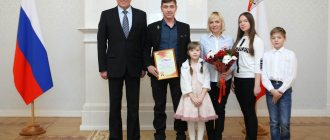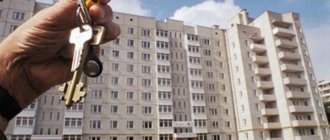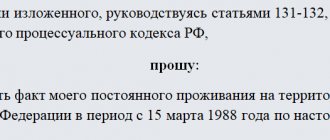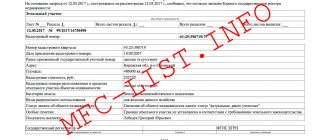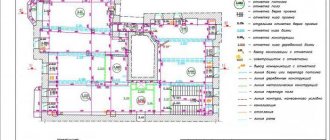Who can apply for improved living conditions?
In order to take part in the “Improvement of Housing Conditions” program, you must become a “City Waiting Person”. General requirements for program participants:
- Residence in St. Petersburg for at least 10 years (subject to permanent registration, it is desirable that the place of registration has not changed for the last 5 years);
- There should be no more than 9 square meters per person. meters, for communal apartments - up to 15 square meters. meters;
Categories of citizens who have the right to register:
- Low-income citizens;
- Large families;
- Disabled people and families with disabled children;
- Heroes of the USSR and the Russian Federation, participants and disabled people of the Second World War, as well as persons awarded the badge “Resident of besieged Leningrad”;
- Citizens rehabilitated after repressions who lost their housing.
First of all, large families, disabled people and families with disabled children, and WWII veterans are considered.
What else do you need to know
A certificate for the use of a subsidy is issued for a period of 12 months, after which the account is blocked, and unused money is returned to the budget by default. But the certificate can be renewed; to do this, within 10 days after the document expires, you need to leave a corresponding application in the office of the Housing Committee.
The commission has the right to extend the validity of the document for another 1 month, but no more.
There is a special offer on our website - you can quickly get advice from a professional lawyer completely free of charge by simply filling out the form below.
"Resettlement of communal apartments" in St. Petersburg
The resettlement of communal apartments is a priority direction of the state housing policy of St. Petersburg. However, the queue moves slowly and is constantly replenished with beneficiaries. Communal apartments in which more than 4 families simultaneously live are subject to resettlement, each of which must give its consent to relocation. A collective application is submitted to the housing department.
To participate in this program, you should pay attention to the fact that not only the area of each family’s property is calculated, but also the corridor, bathroom, and kitchen. It turns out that the area for each person can be more than 15 square meters. m. - this does not meet the conditions.
Documents and a collective application are submitted to the administration of the district of St. Petersburg at the place of residence (registration). The decision on registration or refusal is made within 30 working days. If the decision is positive, a registration file is created for each family.
WHY IS IT PROFITABLE TO WORK WITH US?
- We have qualified specialists who have been certified by the St. Petersburg Association of Realtors;
- legal service guaranteeing the complete legality and purity of the transaction;
- We accompany our client at all stages of the transaction;
- none of the transactions carried out through our agency were disputed in the courts;
- our agency has passed voluntary certification by the RGR (Russian Guild of Realtors);
- With high quality and level of services, our prices are very affordable;
- There is a system of discounts for preferential categories of citizens.
Subsidies for the purchase of housing and improvement of living conditions in St. Petersburg 2021
We wrote in detail about subsidies for improving housing conditions in several previous articles:
- Subsidies for improving housing conditions.
- Conditions for participation in the “Young Family” program.
- Subsidies for large families.
However, not only participants in these programs can improve their living conditions. In this article we will tell you how to get a subsidy for the purchase of an apartment. Namely, about participation in the city program “Providing free subsidies for the construction or purchase of housing.” Since the beginning of 2021, there have been several changes to the program that are worth taking note of.
Previously, anyone on the city waiting list could become a participant in this program. From 2021, only people on the waiting list who live in separate apartments (large families, or citizens with less than 9 sq. m of total area), as well as those who do not have their own housing (rent) can improve their living conditions through the city program. .
The priority right to participate in the program is given to employees of city educational institutions, healthcare facilities, social services, culture and science. Work experience does not matter; the date of housing registration will be taken into account: the longer the “experience” of the person on the waiting list, the greater the likelihood of receiving a housing subsidy.
Participants in this program can be:
- Veterans of the Great Patriotic War (payment of 2,089,980 rubles from the federal budget);
- Veterans and disabled combatants who registered for housing before 01/01/2005 (payment of 1,044,990 rubles from the federal budget);
- Disabled people and families with a disabled child who registered for housing before 01/01/2005 (payment of 1,044,990 rubles from the federal budget);
- Families consisting of two or more people (payment 313,497.0 rubles from the city budget);
- Families consisting of two or more people (payment 313,497.0 rubles from the city budget);
- Citizens living alone (payment of 574,744.5 rubles from the city budget).
Availability of information about programs
Our lawyer, Lyudmila Ivanovna Cherevkova, says: “Not all information about St. Petersburg programs is publicly available. And even when the text of the program and the amount of subsidies are clearly visible and the information is understandable, this does not coincide with the actual figures of subsidies provided and future opportunities. Moreover, a number of programs are being prepared for approval. There may be additional opportunities for them. Understanding the advantages of each program and calculating which program is more profitable to enter into new housing relations with the Administration is not easy even for a practicing lawyer, and, moreover, for a citizen without experience in this area.
I have been working on Affordable Housing programs for more than 15 years, from the very beginning of their inception. And every time I come to the conclusion that no two options are alike. For some it is more profitable to follow a single program, while for others it is better to talk about intra-family divisions of rights and responsibilities and take on different programs, thereby increasing subsidies from the state and significantly improving living conditions. From experience I can say that lawyers have been collecting additional information on each program through experience for years. Not everything that is written in the laws is simple and transparent. There are a lot of pitfalls, there are limits on subsidies in each calendar year, there are a lot of restrictions. In contrast, there are also wonderful opportunities that can be used to improve living conditions.”
LEGISLATION
- Law of St. Petersburg No. 409-61 On assistance to St. Petersburg in improving the living conditions of citizens ›
- St. Petersburg Law No. 221-32 On the housing policy of St. Petersburg ›
- Law of St. Petersburg No. 707-90 On the target program of St. Petersburg “Development of long-term housing lending...” ›
- Law of St. Petersburg No. 513-101 On the target program of St. Petersburg “Resettlement of communal apartments...” ›
- St. Petersburg Law No. 315-45 On the target program of St. Petersburg “Youth - affordable housing” ›
- Decree of the Government of St. Petersburg No. 1545 On the procedure for maintaining records of citizens who need assistance from St. Petersburg in improving housing conditions and interaction between executive bodies... ›
- Decree of the Government of St. Petersburg No. 1541 On the implementation of the St. Petersburg law “On the target program of St. Petersburg “Development of long-term housing lending in St. Petersburg”” ›
- Decree of the Government of St. Petersburg No. 1537 On the implementation of the St. Petersburg Law On the target program “Resettlement of communal apartments...” ›
- Decree of the Government of St. Petersburg No. 1539 On the implementation of the St. Petersburg law “On the target program of St. Petersburg “Youth - affordable housing”” ›
- Decree of the Government of St. Petersburg No. 637 On residential premises of the housing stock for commercial use in St. Petersburg ›
- Government Decree No. 378 On approval of the list of severe forms of chronic diseases in which it is impossible for citizens to live together in the same apartment ›
- Federal Law of the Russian Federation No. 169 On amendments to Article 23.2 of the Federal Law “On Veterans” ›
- Federal Law of the Russian Federation No. 327 On Amendments to the Federal Law “On Veterans”
Registration of citizens who need assistance from St. Petersburg in improving their living conditions
Assistance from St. Petersburg in improving housing conditions is provided to citizens of the Russian Federation who have been permanently residing in St. Petersburg for at least 10 years and are registered as those in need of residential premises provided under social tenancy agreements, or registered as those in need of city assistance to improve housing conditions.
Assistance in improving housing conditions is provided in the following forms:
- providing subsidies from the budget of St. Petersburg for the construction or purchase of housing;
- provision under lease agreements of residential premises of housing stock for commercial use, owned by St. Petersburg;
- providing the opportunity to purchase residential premises of the housing stock for commercial use and other residential premises owned by St. Petersburg for the intended purpose, including with installment payment and on other preferential terms;
- assistance in improving the living conditions of citizens using their own funds in other forms established by the laws of St. Petersburg.
Who is eligible to receive government support for improving housing conditions?
The provision of various forms and types of state support in St. Petersburg in improving the living conditions of citizens is carried out in relation to citizens registered as needing assistance in improving housing conditions or registered as those in need of residential premises provided under social tenancy agreements (recognized in the prescribed manner those in need of improved housing conditions).
Grounds for registering citizens as those in need of residential premises provided under social tenancy agreements
In accordance with the Law of St. Petersburg dated June 30, 2005 No. 407-65 “On the procedure for keeping records of citizens as those in need of residential premises and the provision of residential premises under social tenancy agreements in St. Petersburg”, the mandatory conditions for registering citizens as those in need of residential premises are:
- Residence in St. Petersburg for a total of at least 10 years.
- Property security: monthly income for each family member should not exceed twice the subsistence level per capita established in St. Petersburg;
- the cost of owned and taxable property (real estate, land plots, vehicles) should not exceed 10 times the average market value per square meter of total housing area in St. Petersburg.
Accounting standard for residential area
The accounting standard for housing provision in St. Petersburg is set in the amount of:
- square meters of total living space per person living in separate apartments and residential buildings;
- 15 square meters of total living space per resident in communal apartments.
If there are several residential premises, the level of provision with total area is determined based on the total total area of all specified residential premises.
Standard for providing living space
When providing residential premises under a social tenancy agreement, the minimum size of the total area of residential premises is:
18 square meters per member of a family consisting of two or more people;
33 square meters for a citizen living alone.
Exceeding the norm is allowed by no more than half the norm for providing living space per person.
If during the last five years there have been transactions with residential premises that led to a reduction in the size of the occupied residential premises or to their alienation, the total area of the provided residential premises is reduced by the corresponding number of square meters of the total area of housing. In this case, the total area of the residential premises provided cannot be less than the accounting norm for the area of residential premises per citizen and/or members of his family.
What actions are recognized as “resulting in the deterioration of citizens’ living conditions”?
- Division or exchange of residential premises;
- Moving other citizens (with the exception of spouses and their minor children) into residential premises occupied by citizens;
- Alienation of residential premises or a share of residential premises owned by a citizen by right of ownership;
- Failure to comply with the terms of a social tenancy agreement, resulting in the eviction of a citizen in court;
- Termination of a social tenancy agreement at the initiative of a citizen.
Citizens whose housing security has decreased as a result of these actions may be recognized as needing assistance in improving their living conditions no earlier than five years after they were committed.
Procedure for applicants
- Submitting an application and documents required for registration as those in need of assistance in St. Petersburg in improving housing conditions to the administration of the district of St. Petersburg at the place of residence (registration).
- Obtaining a receipt for documents indicating the list and date of their receipt by the administration of the district of St. Petersburg.
- Receipt of an order (extract from the order) on registration or refusal to register, no later than 3 working days from the date of adoption of such an order or receipt of a Notice of decision to provide assistance.
The decision to register or refuse to register is made by the authorized body based on the results of consideration of the application, but no later than 30 working days from the date of submission of documents.
The decision on registration or refusal to register is issued or sent to the citizen no later than 3 business days from the date of the decision.
For each citizen (family) registered, an accounting file is formed and stored until deregistration. After registering an accounting case, it is assigned a number, which consists of the St. Petersburg district code, the date of registration and the case number itself.
Family members moved in by a citizen after he has been registered are included in the registration file at the request of the citizen only if they correspond to the categories specified above. The exception is minor children moved in with their parents.
Documents provided by the applicant
- Application for registration signed by all adult family members.
- Passport or other identification documents and confirming the citizenship of the Russian Federation of the applicant and his family members (originals and photocopies, especially the title page, registration, marital status, children).
- Documents containing information about family composition and degree of relationship (originals and photocopies, marriage certificates, birth certificates of children.
- Documents containing information about the place of residence of the applicant and his family members; confirming the residence of the applicant and his family members in St. Petersburg for a total of at least 10 years (certificates for F-7 and F-9 and other documents).
- Documents containing information on housing security (certificate from the Main Directorate of the Federal Registration Service for St. Petersburg and the Leningrad Region in relation to all family members, including minor children).
- Documents containing information about the income of the applicant and his family members for the twelve months preceding the application for registration (for citizens recognized as low-income).
- Documents containing information about the value of property owned by the applicant and his family members that is subject to taxation (for citizens recognized as low-income). The value of family owned and taxable property per family member is calculated by dividing the total value of family owned and taxable property by the number of family members.
- Documents confirming the right of a citizen to be provided with residential premises under a social tenancy agreement out of turn.
- Documents confirming the availability of benefits for persons with benefits (originals and photocopies of benefit certificates, including disability certificates).
- Documents on the technical condition of the residential premises (for citizens occupying residential premises unsuitable for living).
- Other documents necessary for registering citizens who need assistance from St. Petersburg in improving their living conditions.
Documents issued to the applicant
- Receipt for receipt of documents indicating the list and date of their receipt by the administration of the St. Petersburg district.
- Order (extract from the order) on registration or refusal to register.
- Notification of the decision to provide assistance (if registered).
A list of documents to be considered when registering as those in need of residential premises for rehabilitated persons who have lost residential premises in St. Petersburg due to repression, members of their families and other relatives who lived together with repressed persons before the application of repression against them, as well as children born in places of imprisonment, exile, deportation, in special settlements, and citizens who are tenants or owners (family members of tenants and or owners) of residential premises in communal apartments, are approved by the authorized body.
A citizen’s application for registration is registered in the book of registration of applications for registration. The citizen is issued a receipt for documents indicating the list and date of their receipt by the authorized body.
Organization accepting documents from the applicant:
Housing departments of district administrations of St. Petersburg
The organization making the decision to provide the service:
Housing departments of the district administrations of St. Petersburg; Housing Committee.
The result of the provision of the service is receipt of notification of the decision to provide assistance.
Removal from housing register
Citizens are subject to deregistration from housing registration in the following cases:
- providing them with assistance in improving their living conditions or providing them with residential premises under social tenancy agreements in St. Petersburg;
- submitting an application to the authorized body for removal from housing registration;
- loss of grounds for recognizing them as needing assistance in improving their living conditions;
- their departure to their place of residence outside the territory of St. Petersburg;
- identification in the documents submitted by them to the authorized body of information that does not correspond to reality and served as the basis for registration, as well as unlawful actions of officials of the authorized body;
- the entry into force of a court decision to declare a person in need of assistance in improving their living conditions dead or to recognize him as missing without deregistering the family members who lived with him;
- death of a person in need of assistance in improving living conditions without deregistration of family members living with him.


